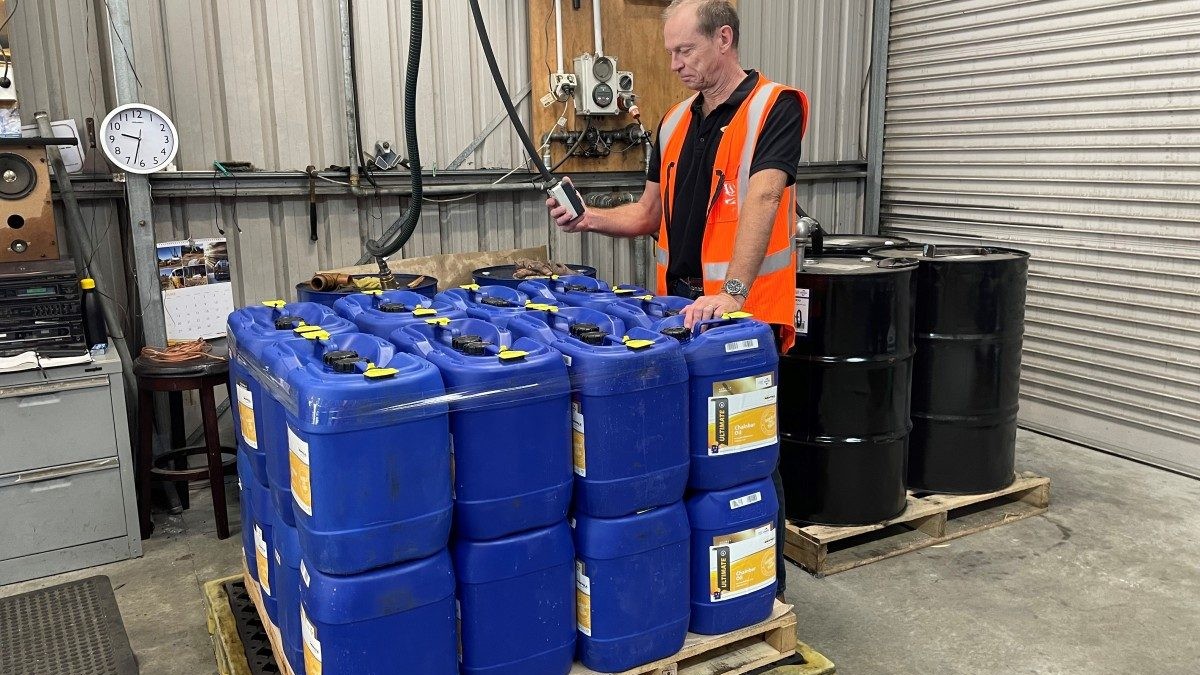What’s even better than recycling packaging? Reusing

Since 2020, Fuchs Lubricants has maintained a carbon-neutral balance sheet for its own processes worldwide, and is now reaching out to suppliers and customers to help it improve sustainability.
Fuchs’ distributor in New Zealand, McFall Fuel, has put this principle into action in a way that has not only given Fuchs a winning proposition in the forestry sector, but is also delivering big wins for the customer and the environment.
McFall Fuel doesn’t just manage its lubricant packaging — which used to be a big waste issue for forestry customers — it refills and reuses it.
McFall Fuel runs a fleet of mostly Euro-6 tanker trucks that recently increased to 80 vehicles after McFall took over the Toll Petroleum transport fleet in Northland. Managing director, Allan McFall, said the company also distributes Fuchs lubricants, which are an ideal match to the company’s main fuel business, as vehicles and equipment that use fuel also need lubricants.
“In the first place, our customers trust us so they trust that we are going to source good products for them and Fuchs fits that criteria for us,” McFall said.
McFall said that with the product quality a given, it’s the innovation in service that has built McFall Fuel’s customer base in the forests.
Chain and bar oil is distributed in 20-litre containers that can be easily handled in the forest for frequent lubrication of cutting equipment. Chain and bar oil is used in significant quantities, not just on standard manual chainsaws but on the large tree-processing, felling, and harvesting ‘heads’ operated by digger drivers in the forest.
“Chain and bar lubricant is a very high-use item for forestry customers. We import that in 20,000-litre bladders and we decant it into 20-litre containers,” McFall said.
Such is the scale of use that empty 20-litre containers would rapidly pile up into a big headache for forestry companies. McFall Fuel agreed to take back all the empty containers, which was already an added-value service, but there were so many of them McFall realised there had to be something better than sending them to landfill or even for recycling.
It was at a school camp, while using a fast commercial dishwasher, that the answer came to him.
“It got me thinking; if we could get industrial versions of these washers we could actually wash those containers and send them back out again. That’s where it all started,” he said.
We developed a few different ways and means of washing them and ended up with an industrial steam washer that washes the outside of them and gets them all spick and span again.”
The energy savings from avoiding transportation and reprocessing, plus the efficiency gains in a fast reuse cycle, are many times better than recycling the plastics in containers.
“Some of those containers have been round the circle 15 to 20 times, so that’s a lot of containers saved from going to landfill over the years,” said McFall.
“It’s quite a process to do it but it’s well worth it as the customers love getting rid of their plastic containers, which are a big problem for them, and we love that we manage to reuse them and send them back out again instead of having to dispose of them.”
Containers that come back but are not able to be reused are sent off to be shredded and are then put into posts by a Napier business. Any waste oil collected goes to a tomato-growing business for use in its furnaces.
McFall Fuel initially used new labels on the side of the containers to mark off how many times the container had been reused, but these got frayed in the cleaning process. In a recent development, the McFall Fuel team has begun adding a plastic ‘ear tag’ to each container that can be punched each time that container is refilled, which means the labels on the sides can be replaced when necessary without losing the count.
McFall said the sales team was not pleased to see containers going out with labels in increasingly second-hand condition.
“They wanted them to look immaculate. I had to spend a bit of time convincing them what mattered was how many times they were used and reused. The scars were a badge of honour,” he said.
The ecological benefit is not lost on forestry customers, who are increasingly conscious of environmental performance. Allan has seen a significant change over the years.
“There have been a lot of technological changes in a number of the lubricants like the engine oil and hydraulics; they have got a lot more advanced and fuel efficient,” said McFall.
“In terms of chain and bar, operators pay a lot of attention to what goes on them now because efficiency is really important. Back in the old days, it was old cooking oil and old engine oil that they used to chuck on their bars; now it’s a product in its own right, so the technology has moved on a lot.”
McFall worked with Fuchs to develop a bar and chain oil with the optimum mix of lubrication and tackiness for work in the New Zealand forests. Those qualities of innovation and value have helped cement the position of Fuchs and McFall Fuel as a major supplier to the forestry industry.
“We tried a biodegradable chain bar a few years ago. We haven’t yet quite reached the right price point, but I think that time will come as they are getting more and more conscious all the time of the environmental piece of the puzzle,” McFall said.
“It’s always a quality/price trade-off for forestry customers. They want quality products but, because they are big users, they are quite price conscious as well, so Fuchs is a good match.”





